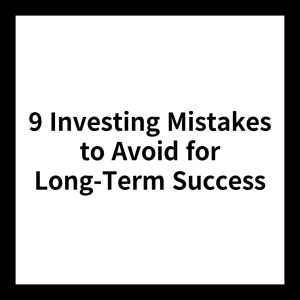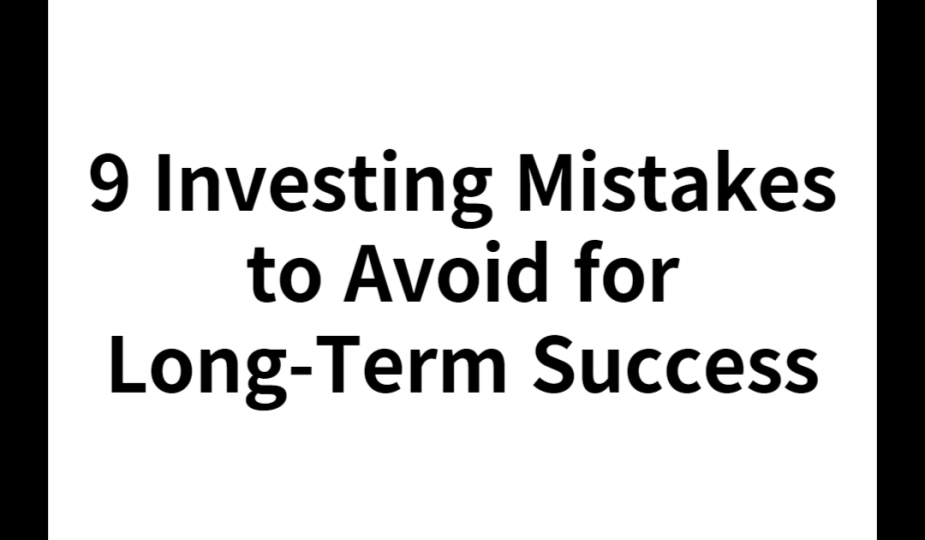Common Investing Mistakes to Avoid for Long-Term Success

Investing is a crucial aspect of building long-term financial success.
However, it’s important to approach investing with caution and avoid Investing Mistakes that can hinder your progress.
In this article, we will discuss some of the most common investing mistakes individuals make and provide tips on how to avoid them.
Here are 9 investing mistakes you’ve made!
1. Failing to Set Clear Financial Goals
One of the biggest investing mistakes is not having clear financial goals.
Without specific goals, it’s difficult to create a well-defined investment plan.
Take the time to determine what you want to achieve through investing, whether it’s saving for retirement, purchasing a home, or paying for your child’s education.
Setting clear goals will help you stay focused and make better investment decisions.
2. Trying to Time the Market
Many investors fall into the trap of trying to time the market, which means buying and selling investments based on short-term market fluctuations.
The reality is that successfully timing the market consistently is nearly impossible.
Instead of trying to predict market movements, focus on a long-term investment strategy that aligns with your goals and risk tolerance.
3. Neglecting Diversification
Another one Investing Mistakes is failing to diversify your investment portfolio.
Putting all your eggs in one basket can be risky, as it leaves you vulnerable to the performance of a single investment.
Diversification involves spreading your investments across different asset classes, industries, and geographical regions.
This way, if one investment performs poorly, the others may help decrease the overall impact on your portfolio.
4. Overreacting to Short-Term Market Volatility
Financial markets are constantly fluctuating, and it’s essential not to overreact to short-term volatility.
It can be tempting to panic and sell investments when the market is down, but this reactive approach can cause you to miss out on potential long-term gains.
Stay disciplined and stick to your investment plan, considering the bigger picture rather than focusing on daily market movements.
5. Failing to Monitor and Review Investments
Investing is not a one-time activity. It requires regular monitoring and review to ensure your investments are performing in line with your expectations.
Failing to review your portfolio can lead to missed opportunities or allowing poor-performing investments to drag down your overall returns.
Set aside time periodically to assess your investments and make any necessary adjustments.
6. Misunderstanding Risk Tolerance
Understanding your risk tolerance is crucial in making appropriate investment decisions.
Some individuals may be more comfortable with higher-risk investments, while others prefer a more conservative approach.
It’s important to align your investments with your risk tolerance to avoid unnecessary stress or regret.
Consult with a financial advisor if you’re uncertain about your risk tolerance or need guidance on suitable investments.
7. Ignoring the Impact of Fees
Fees can significantly impact your investment returns over time.
Many investors fail to consider the impact of fees, such as management fees and transaction costs, when selecting investment options.
It’s essential to carefully evaluate potential fees and choose investment vehicles that offer competitive rates.
Opting for low-cost index funds or exchange-traded funds can help minimize fees and maximize your investment returns.
8. Allowing Emotions to Drive Investment Decisions
Investing can be emotionally challenging, especially during periods of market volatility.
Allowing fear or greed to drive your investment decisions can lead to costly mistakes.
Try to remove emotions from the equation and base your investment choices on facts, research, and your long-term goals.
Having a well-thought-out investment plan and sticking to it can help you avoid making impulsive decisions based on short-term market conditions.
9. Not Seeking Professional Advice
Investing your hard-earned money can be overwhelming, especially if you’re new to the world of investing.
Seeking professional advice can provide you with valuable insights and guidance tailored to your specific financial situation.
A certified financial planner or investment advisor can help you develop an investment plan, assess your risk tolerance, and create a diversified portfolio that aligns with your goals.
Conclusion
Avoiding common investing mistakes can significantly increase your chances of long-term investment success.
By setting clear financial goals, diversifying your portfolio, understanding risk tolerance, and staying disciplined, you can navigate the complex world of investing with confidence.
Remember, investing is a journey, and it’s essential to continually educate yourself, seek guidance when needed, and adapt your strategy as your circumstances change.
Let’s reduce investing mistakes!






